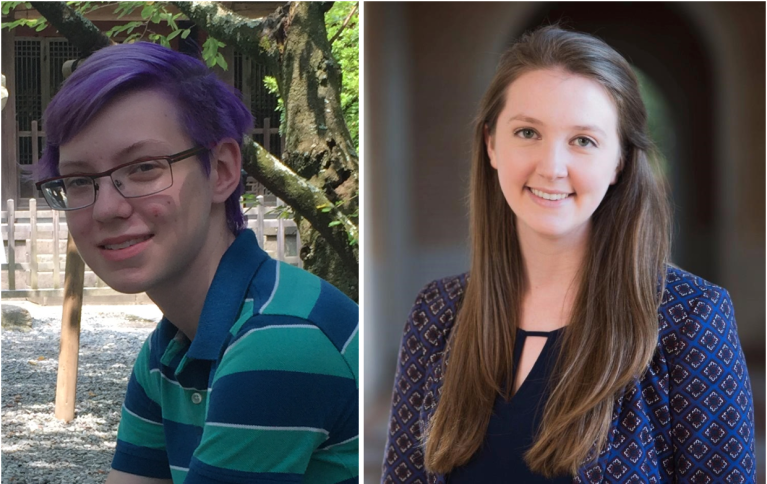Bioengineering Ph.D. student Alex Ferris and electrical engineering Ph.D. student Sarah Hooper will intern at the Bill and Melinda Gates Foundation in Seattle this summer after being selected for the Hertz Fellowships in Global Health and Development. Ferris will conduct research on the cassava brown streak disease for their second summer and Hooper will study statistical approaches to improving malaria diagnosis.
Sponsored jointly by the Hertz and Gates foundations, the Hertz Fellowship aims to bring selected graduate students to work on global challenges in an impactful way. For some, it is the first time that they have done research outside of academia.
“The goal of the internship, in addition to providing Hertz Fellows exposure to and experience in new ways how their research and expertise might be applicable to the changing world, is to contribute to the success of whatever team they’re working in,” said Bennett McIntosh, Hertz Foundation Communications Officer.
The partnership is relatively new. This summer, the number of Hertz Fellows has grown from two participants to seven. These participants will intern for two summers over the course of their Ph.D.. At the Gates Foundation, interns receive a salary on top of their Hertz Fellowship support.
“I’m excited for this summer not only because it’s a larger program but because the interns are covering a wider variety of problems and topics,” McIntosh said. “We have expertise in life science, physics, applied mathematics and engineering. I hope that this trend of diverse interests is one that will continue with future Hertz fellows that enter the program.”
At chemical engineering professor Elizabeth Sattely’s lab, Ferris researches how plants create specific natural products and how to engineer these pathways in different plant species.
Last summer, they worked on developing a field-level model for the spread of a damaging infection for cassava plants known as cassava brown streak disease. Cassava is a staple food in Africa, where its resilience in dry, nutrient-poor environments has made it a popular crop for farmers.
Ferris is also looking at improving a model predicting cassava growth.
With urban data gathered from Uganda in a project funded by the Gates Foundation, Ferris is working with a fellow Gates Foundation grantee at the University of Cambridge to build a model on how the brown streak disease spreads.
“I’m working on a smaller model about how it spreads in a field, and then we can use that data to be useful to the larger model,” they said. “[Another outcome of this research] would be seeing how surveys can be more useful and how the number of flies changes how quickly the virus spreads.”
Through the Gates Foundation’s Great Lakes Cassava Initiative aimed at protecting cassava, the availability of “virus-free,” quarantined cassava has increased.
Ferris emphasized the value in both practical and theoretical experiences in the lab. They believe that their work at the Gates Foundation differs from the more theoretical approach of Stanford labs.
“Research at the Gates Foundation is much more practical and concrete because it’s impact-driven,” Ferris said.
In addition, at the Gates Foundation, Ferris is able communicate with their fellow grantees about their work.
“A lot of the times, one of the grantees will come in to tell us about their project, and I’ll have a chance to ask questions,” said Ferris.
Hooper is a part of a team looking at malaria and ways to improve the methods for its diagnosis. Her team is a subdivision of the Innovative Technology Solutions Team at the Gates Foundation.
Malaria is a life-threatening blood disease transmitted to humans through the bite of the mosquito. Once an infected mosquito bites a human, the parasites multiply in the host’s liver, infecting and destroying red blood cells in the process.
In many places, transmission is seasonal, peaking during and just after the rainy season. Hooper is hoping to use big data tools to better estimate the spread and timing of malaria.
“In the last five to ten years, there’s been a huge data revolution, which influenced how technology functions and how we can incorporate tools based in statistics into malaria research,” said Hooper. “To use data about which country the malaria is in, and what time of year the malaria occurs […] we can improve the diagnostic tests to improve treatment procedures.”
Hooper is also looking at diagnostic tools for malaria, which involves research on past strategies and approaches towards diagnosing malaria around the world.
“I do lots of research about what non-invasive diagnostic tools are available, if they’ve been developed yet, [and] the benefits it could bring to the global health sector,” Hooper said.
Previously, Hooper has created accessible medical devices in Malawi and used data science to create a seizure prediction system for patients with epilepsy. At Stanford, she works in radiology professor Sanjiv Sam Gambhir’s research lab, which develops imaging for the detection and treatment of diseases.
Though this is her first research experience outside academia, Hooper believes that the Gates Foundation is interested in finding people who are dedicated to and passionate about their causes.
“The fellows are all open to trying to answer difficult and unknown questions,” said Hooper. “People don’t necessarily have a background in the field that they’re working in, but everyone’s willing to go into the unknown field and start working on them and learn along the way.”
Hooper enjoys how the nonprofit is connecting her with many tech companies, NGOs and researchers across the world with missions to tackle challenging problems like the eradication of malaria and polio.
Beginning in 1963, the Hertz Fellowship has allowed graduate students across the country to pursue five years of fully-funded research in the fields of applied physical, biological and engineering science. Fellows are free to pursue their interests and explore opportunities across multiple universities, research labs and disciplines throughout their five years.
A previous version of this article referred to Ferris in one instance using an incorrect pronoun. The Daily regrets this error.
Contact Jessica Zhang at jzhang ‘at’ mxschool.edu.
